|
|
2003 European
Championships
26 April-4 May 2003
Bergen |
The Own Choice Selections
4BR casts an eye over the own choice selections that
have been made by the bands in their attempts to take the title.
Over the years this has proved to be the most fascinating aspect
of the contest as bands have tried to "showcase" their
talents to impress the judges. Sometimes though the music loses
out as the bands try to bring the house down.
Fashion and composers change and it is interesting to note how the
successful choices have moved from the likes of Vinter, Arnold and
Gregson through to Sparke and finally Wilby. In between though we
have had a touch of Ravel and memorably Heaton and Bourgeois as
well. Which composer will come out on top this year then?
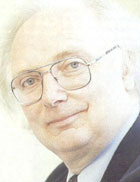 Dove
Descending – Philip Wilby Dove
Descending – Philip Wilby
Dove Decending was written for the British Open Brass Band Championships
of 1999 which was won by Yorkshire Building Society conducted by
David King. The title is taken from the T.S. Eliot poem “Little
Gidding” and is described by the composer as a Sonata in open
tones. The performance requires a standard seating arrangement but
in addition requires two groups of fanfare stands for ten cornet
players which are to be placed in a five right/five left formation,
plus three extra stands for trombones placed at a distance from
the band and from each other. There is an optional organ part as
well as the requirement to use a CD player. A seating plan is issued
for the performing band to adhere to.
In essence the work is divided into two main parts – the
first which the composer notes contains three elements – “a
heraldic fanfare, a musical picture of Time composed in the open
tones of the harmonic series and then the Old Testament description
of the coming of Christ. The second part by contrast is a beautiful
solo prayer entitled “Nativity” which finally leads
into a resolution and return of the coming of Christ.
The piece has proved to be immensely popular with both bands and
audiences, even though it is a very long work in terms of time.
It is though a very demanding work that only the very best bands
can really make a true performance of.
The piece has been chosen on a number of occasions by bands for
this contest since 2000 with Yorkshire Building Society playing
it in Birmingham as well as Fodens Courtois. Aarhus used it again
in 2001. It was used by both BB Willebroek and Eikanger Bjorsvik
Musikklag last year in Brussels, although as yet it has not provided
any of these bands with a winning performance in the Own Choice
section of the contest.
 Jazz
– Philip Wilby Jazz
– Philip Wilby
Jazz was written by Philip Wilby after the composer had visited
New York in June 1996. In the preface to the score the composer
writes that he was “captivated by the ceaseless energy of
the metropolis, with its short active history, and its intense but
heartless glamour. In many ways, New York was born in the Jazz Age,
and the sound of Big Band Jazz is like its musical alter ego. Where
the Lincoln Centre now stands were once the original apartment blocks
that inspired West Side Story, and those other Symphonic Dances:
my composition cannot help but take inspiration from the sound and
style of Bernstein’s masterpiece.”
After the amazing lip glissandi leap on the euphonium the work
explores the different idioms of “jazz” from bebop to
swing with solo and ensemble features such as the “Eddie Calvert”
cornet solo. Although the parts are “written” the secret
lies in the way in which the different idioms is approached –
jazz is not written it is felt. It remains a style of writing that
brass bands find exceptionally difficult to play well and as such
is a piece that has yet possibly to have fully appreciated.
The piece was used as the set work for the 1997 All England Masters
Championships which were won by the Williams Fairey Band, as well
as the set work for the 2001 Regional Championships of Great Britain.
It is the first time that it has been used as an own choice selection
at these championships.
 Revelation
– Philip Wilby Revelation
– Philip Wilby
Revelation was commissioned by the British Open Brass Band Championships
with funds provided by the Worshipful Company of Musicians and the
Harry Mortimer Trust for the 1995 British Open Championships, which
was won by the Black Dyke Band conducted by James Watson. It is
titled “Symphony for Double Brass on a theme of Purcell”
– 1995 being the tri-centenary of the English composers death,
whilst it’s inspiration comes from the poem by John Donne
who describes “Revelation” as “At the Earth’s
imagined corners, blow your trumpets, angels, and arise, arise from
death, you numberless infinities Of souls, and to your scattered
bodies go. All whom the flood did, and fire shall o’erthrow.
All whom war, death, age, agues, tryannies, Despair, law, chance
hath slain, and you whose eyes Shall Behold God, and never taste
death’s woe.”
The work lasts some 15 minutes and requires virtuoistic playing
from both soloists and ensemble. Many of the solo lines must be
played standing to the front of the band, which is split into two
brass ensembles with percussion at its centre. The climax of the
music is declared with a section of abandonment before the “Revelation”
of Gods creation is reaffirmed in all its glory.
Since its use at the Open the piece has proved immensely popular
with bands throughout Europe and at this contest it has been used
twice in 1996 (YBS and Black Dyke who came 1st and 2nd in the own
choice section), once in 1999 by Midden Brabant and twice in 2002
by Black Dyke and CWS Glasgow.
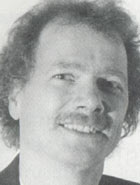 Tristan
Encounters – Martin Ellerby Tristan
Encounters – Martin Ellerby
Tristan Encounters (Prelude and Transfigurations for Brass and
Percussion) was commissioned by Philip Biggs and Richard Franklin
with funds provided by the Foundation for Sport and the Arts, for
the 1999 All England Masters Brass Band Championships which was
won by the Yorkshire Building Society Band conducted by David King.
The work is derived from Wagner’s Prelude to the opera “Tristan
and Isolde” and comprises a series of mood pictures which
alternate between the romantic and the tri tone style of aggressive
music. These alternates are sometimes severe throughout the 14 transfigurations
(Wagner’s descriptive word for variations) and although the
composer uses quotes from the Prelude it is very much music of the
modern genre.
Although the work is continuous each transfiguration is well defined
even if it may only be brief in time, with the crux of the whole
piece coming in a series of cadenza features for soprano, cornet,
euphonium, flugel horn, baritone, trombones, Eb bass and Bb bass
at transfiguration 12. The composer enigmatically notes that “I
am sure there is something of all our experiences in this work –
which ones are yours?”
The work is dedicated to Rodney Newton and has been used just the
once before by the Midden Brabant band as their own choice selection
in 2001.
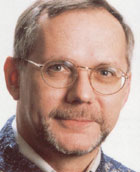 Harmony
Music – Philip Sparke Harmony
Music – Philip Sparke
Harmony Music was commissioned by Boosey and Hawkes Band Festivals
Ltd for the 1987 National Brass Band Championships of Great Britain,
which was won by the Desford Colliery Dowty Band conducted by James
Watson.
The title is both a play on the German “Harmoniemusik”
with all its associations with bands in general as well as a reference
to the overall tonal harmonic language of the piece. The piece opens
quietly with a long unison crescendo, interupted by upward rushes
from the basses and trombones which introduce a fanfare like passage
from the cornets. A sonorous chorale follows which builds from the
lower band to a tutti climax.
There is a brief hint of faster music but before this is an immensely
difficult euphonium cadenza which reaches both extremes of the instruments
range. The Motlo Vivace is fast and furious as well as Francophile
in style before the music subsides to a haunting homage to the composer
Maurice Ravel which incorporates two accompanied cadenzas for cornet
and horn. The opening returns before a shuddering climax that is
tumultuous. The soprano and trombones try in vain to stop the chaos
before a Presto Coda ends the work. Even some 16 years after it
was written it is a piece that requires immense amounts of skill
and talent from both players and MD to make come off, and remains
one of the composers most accessible and popular compositions.
DeWaldsand used the piewce first in 1988. Black Dyke won the own
choice section of this contest with the work in 1990 and has also
been used by De Waldsang in 1991, BTM in 1992, Cory in 1993, Willebroek
in 1994, Manger Musikklag and Burgermusik Luzerne in 1996, YBS to
win the own choice section in 1999 and by BB Treize Etoiles in 2002.
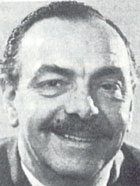 Spectrum
– Gilbert Vinter Spectrum
– Gilbert Vinter
Spectrum was written by Gilbert Vinter for use as the set work
for the 1969 British Open Brass Band Championships which was won
by the Grimethorpe Colliery Band conducted by George Thompson. Perhaps
no other piece of music has created such a furore before or since
in the brass band world. 1969 was the first year percussion was
allowed in full and the music itself was scored for bongos, claves,
wood block, tambourine, triangle, cymbal, side drum and bass drum
– interestingly it was not scored for timpani.
Vinter who was born in 1909 was a mild and sensitive man and was
greatly upset by the furore from ill informed brass band conductors,
many of whom vowed never to return to the Open. By the end of that
year (10th October) he was dead and only one more work – James
Cook was released (five years later).
The piece is a highly descriptive musical picture of the colours
of the light Spectrum - Red, Orange, Yellow, Green, Blue, Indigo
and finally Purple (rather than Violet which in itself was a deeply
personal choice for the composer). Each colour change is felt in
the music, sometimes gay, sometimes vivid, sometimes mechanical,
exotic or thoughtful and it covers many moods. It is a masterpiece
of descriptive musical writing, even if today it seems amazingly
mainstream in its musical language. It is however a true classic
of the brass banding world.
The piece has been used on many occasions at the Championships.
In 1978 by Silkeborg Blaeserne, 1982 by Soli Deo Gloria, 1983 by
both Manger and Solna, 1989 by Kortrijk, 1994 by Solna and 1998
by Midden Brabant.
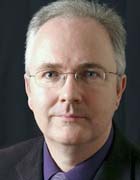 Montage
– Peter Graham Montage
– Peter Graham
Montage was commissioned by the All England Masters Brass Band
Championships to be used for their contest in 1994, which was won
by the BBS Fodens Band conducted by Howard Snell.
Peter Graham had written extensively for brass bands before he
wrote Montage, but this composition represented a major shift in
his compositional outlook and sought its inspiration from the likes
of Lutoslawski and Messian. It is a three movement work that lasts
around 15 minutes in duration. The first movement intrada forms
a perfect ABCBA arch. Generative thematic fragments appear in A
above a pulsating timpani line which in turn is mirrored by the
glockenspiel; B is characterised by glittering cornet work and figures
whilst C is a sinuous duet punctuated by sharply descending semitones.
The middle movement is a beautiful detached chaconne, both expressive
and melodic which revolves around a chord sequence which builds
to the climax of the whole piece. The final Rondo is full of drive
and verve and moves towards a powerful conclusion, direct from the
opening soprano and bass feature towards to very ending which makes
immense demands on players stamina and technique.
Since its use at the Masters “Montage” has proved a
popular work and has been used extensively throughout Europe. In
1998 it was used as the regional test piece for the National Championships.
At the European it has been used by Manger Musikklag in 1995, Tredegar
and Tertnes in 1996, De Cuivre Valaisan and Point of Ayr in 2000
and Yorkshire Building Society (to win the own choice section) in
2001.
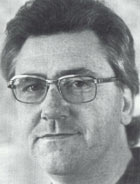 Concerto
Grosso – Derek Bourgeois Concerto
Grosso – Derek Bourgeois
Concerto Grosso was written by the composer as far back as 1979,
and was originally not a full brass band composition. The initial
piece was in fact written for the Philip Jones Brass Ensemble, a
ten-piece made up of four trumpets, 1 French horn, 4 trombones and
a tuba and was written especially for Philip Jones’ farewell
concert.
Bourgeois was at that time the Professional Musical Director of
the Sun Life Band in Bristol and when in 1990 the band was asked
to perform on the BBC radio programme “Bandstand” the
composer took the opportunity of re-scoring the work for full band.
Although an immense “tour de force” the composer believes
it to be within the capabilities of most top class Championship
bands, although he believes that organisers of the major contests
have been reticent to use the piece due to its length – it
is 20 minutes long. Written in three main parts it is played as
a continuos piece and explores in each of its sections material
that ranges from the technically brilliant to the sombre, beautiful
melodic yet with a real sense of fun and wit. Each of the major
solo players within a band has material that extends their capabilities
to the limit whilst the ensemble is tested to the full. It remains
today perhaps the most vividly brilliant of brass band compositions.
Due to its immense difficulty and length it comes as little surprise
that it is rarely heard on a contest stage, with Yorkshire Building
Society giving the work its European Premiere in 2002, whilst Stavanger
used it in 2003 to win the own choice section of the Norwegian Championships.
 Masquerade
- Philip Wilby Masquerade
- Philip Wilby
Masquerade was described as being "unplayable" when it
was first commissioned for the 1993 British Open Championships,
which were won by the Williams Fairey Band conducted by Major Peter
Parkes.
At that time it was indeed perhaps the technically most difficult
piece of brass writing ever to test bands on the contest stage,
and the Open that year saw the piece received quite cooly as it
took many casulaties.
Wilby took his inspiration from Verdi's last opera "Falstaff"
and the piece itself uses elements from the original story and music.
Falstaff is a larger than life figure, full of boast and bravado,
although this leads him into trouble and the ladies of the town
get their own back on him at night in Great Windsor Park.
The msuic is highly descriptive (there is the use of a large whiskey
bottle) but there are also some beautifully realised moments of
passion and thoughtfulness. The rising of the moon over the Park
as the goblins and elves assemble is perhaps sme of Wilby's best
work whilst th ending demands the greatest amount of technical brilliance
to come off.
The piece was used as the set work for the 2002 National Championships
of Great Britain and on this occasion it proved much more accessible
to bands and the audience, proof that brass ban playing had progressed
in the 10 years from its last domestic use.
At this championship it has been used by Williams Fairey in 1993
to win the own choice section, by Midden Brabant in 1996 and by
CWS Glasgow in 1999.
© 4BarsRest
 back
to top back
to top
| 
